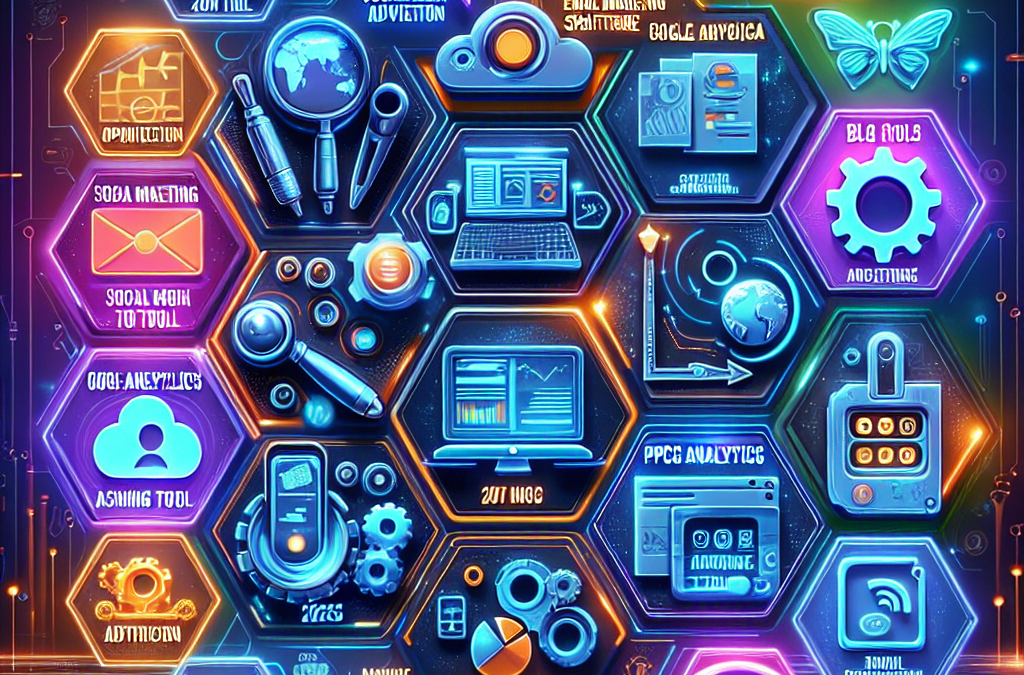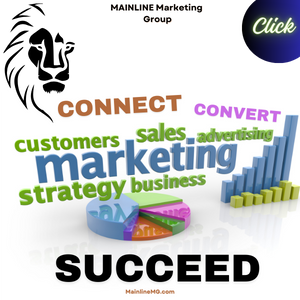- Social Media Management Platforms
- Email Marketing Software
- Search Engine Optimization (SEO) Tools
- Content Creation and Curation Tools
- Analytics and Data Insights
- Online Advertising Platforms
- Customer Relationship Management (CRM) Systems
- Influencer Marketing Tools
- Marketing Automation Tools
- Landing Page & Conversion Optimization Tools
1. Social Media Management Platforms
Streamlining Your Social Presence
In 2025, managing multiple social media channels efficiently is crucial for online success. Social media management platforms like Hootsuite, Buffer, and Sprout Social help you schedule, publish, and analyze content across platforms such as Facebook, Instagram, LinkedIn, and TikTok. These tools eliminate the hassle of manual posting and ensure consistent messaging.
By using these platforms, businesses can maintain an active social presence without constantly being online. Automated scheduling saves time, while analytics dashboards provide insights on engagement, reach, and audience demographics. For example, a small business in 2025 can plan a month’s content in just a few hours, reaching thousands of followers with minimal effort.
Engagement and Customer Interaction
Beyond scheduling, many social media tools include features for monitoring mentions and comments, enabling brands to respond promptly and foster community engagement. Real-time notifications allow you to address customer inquiries, improving trust and loyalty.
Additionally, advanced platforms utilize AI to suggest optimal posting times and content ideas based on audience behavior. This strategic approach maximizes the effectiveness of your social media efforts, translating into increased brand visibility and sales.
2. Email Marketing Software
Effective Email Campaigns in 2025
Despite the rise of social media, email remains a powerful marketing channel. Email marketing software like Mailchimp, ConvertKit, and ActiveCampaign enable you to create personalized, automated email campaigns that nurture leads and boost conversions.
In 2025, leveraging AI-driven segmentation and personalization features can significantly improve your open and click-through rates. For instance, sending tailored product recommendations based on customer behavior increases the likelihood of purchase.
Automation and A/B Testing
Automation workflows save time by sending targeted emails triggered by user actions, such as cart abandonment or newsletter sign-ups. Furthermore, A/B testing different subject lines, content, or send times helps optimize campaigns for maximum ROI. Data from 2025 shows businesses that implement automation see a 30% increase in revenue compared to manual efforts.
3. Search Engine Optimization (SEO) Tools
Improving Visibility on Search Engines
SEO remains vital for online success, and tools like SEMrush, Ahrefs, and Moz provide comprehensive keyword research, site audits, and backlink analysis. In 2025, these tools incorporate AI to predict trending keywords and suggest content improvements, giving you a competitive edge.
Optimizing your website for voice search and mobile-first indexing is crucial in 2025. SEO tools help identify technical issues and track rankings, ensuring your site stays visible and ranks higher on Google.
Content Optimization Strategies
Creating SEO-optimized content relies on understanding intent and relevance. These tools assist in identifying long-tail keywords and content gaps, enabling you to produce valuable content that attracts organic traffic. Consistent use of SEO tools leads to higher organic visibility and sustained growth.
4. Content Creation and Curation Tools
Designing Stunning Visuals
Visual content is king in 2025, and tools like Canva and Adobe Spark make creating professional graphics easy for everyone. These platforms offer templates for social media posts, infographics, and videos, helping you produce engaging content quickly.
Incorporating eye-catching visuals increases audience engagement and brand recall. Leveraging these tools ensures your content stands out in crowded digital channels.
Content Curation and Management
Sharing third-party content relevant to your niche positions your brand as an industry authority. Tools like Feedly and Pocket help curate articles, blogs, and news that resonate with your audience. Automating content curation helps maintain a steady flow of valuable information, reinforcing your brandâs credibility.
5. Analytics and Data Insights
Data-Driven Decision Making
Without proper data analysis, marketing efforts can become guesswork. Google Analytics 4, combined with platforms like Tableau and Looker, provide deep insights into user behavior, campaign performance, and conversion pathways in 2025.
These tools allow you to track key performance indicators (KPIs) across channels, helping refine strategies and allocate budgets effectively.
Predictive Analytics and AI
Advanced analytics utilize AI to forecast trends and consumer behaviors, enabling proactive decision-making. For example, predictive models can suggest the best times to launch campaigns or highlight emerging markets, giving your business a competitive advantage in 2025.
6. Online Advertising Platforms
Effective Paid Campaigns
Platforms like Google Ads, Facebook Ads, and TikTok Ads continue to dominate digital advertising in 2025. These platforms offer advanced targeting options and automated bidding strategies that ensure you reach your ideal audience efficiently.
Using data from these advertising tools, you can create highly targeted ads that convert, whether for brand awareness or direct sales. Continuous optimization based on analytics improves ROI over time.
Retargeting Strategies
Retargeting ads help re-engage visitors who didn’t convert the first time. Investing in retargeting with these platforms helps nurture leads through the sales funnel, improving overall conversion rates.
7. Customer Relationship Management (CRM) Systems
Streamlining Customer Interactions
CRM systems like Salesforce, HubSpot, and Zoho are critical for managing customer data and interactions. In 2025, integrating CRM with marketing automation platforms allows for personalized communication at every touchpoint.
This integration helps build stronger customer relationships, increasing retention and lifetime value. Automated follow-ups and tailored offers are now standard practices supported by these powerful tools.
Data Management and Segmentation
Effective segmentation based on CRM data enables targeted marketing campaigns, which improve engagement rates. Use CRM insights to identify high-value customers and craft personalized marketing messages that resonate specifically with their needs.
8. Influencer Marketing Tools
Identifying the Right Influencers
Tools like AspireIQ, Upfluence, and Traackr help brands discover influencers whose audiences align with their products or services. In 2025, these platforms utilize AI to assess influencer engagement, authenticity, and audience loyalty.
Partnering with the right influencers can significantly boost brand visibility and credibility, especially in niche markets where trust is paramount.
Campaign Management and Tracking
Influencer marketing tools simplify campaign management by tracking deliverables, engagement, and ROI. Real-time analytics allow brands to optimize campaigns on the fly, ensuring maximum impact in 2025.
9. Marketing Automation Tools
Automating Repetitive Tasks
Marketing automation platforms like HubSpot, ActiveCampaign, and Marketo enable automation across email, social media, and CRM. Automating repetitive tasks frees up your time to focus on strategy and creative efforts.
Automated workflows can nurture leads, score prospects, and trigger personalized messages based on user behaviors, increasing engagement and conversions.
Personalization at Scale
Using automation, you can deliver tailored experiences to thousands simultaneously. Dynamic content blocks, personalized email sequences, and AI-driven recommendations are powerful features helping brands stand out in 2025.
10. Landing Page & Conversion Optimization Tools
Creating High-Converting Landing Pages
Tools like Unbounce, Instapage, and Leadpages enable you to craft optimized landing pages without coding skills. In 2025, these platforms include AI features that suggest layout improvements and A/B testing options to maximize conversions.
Effective landing pages directly influence your marketing ROI by turning visitors into customers with compelling offers and easy navigation.
Conversion Rate Optimization Techniques
Beyond creating landing pages, use heatmaps and visitor recordings to understand user behavior. Continuous testing and improvements help increase your conversion rates over time, essential for online success in 2025.
Conclusion
In 2025, leveraging the right online marketing tools is essential to staying ahead in the competitive digital landscape. From social media management to advanced analytics, each of these tools plays a vital role in boosting your success. Remember, the key is to choose tools that align with your goals and integrate seamlessly into your marketing strategy. Embracing these technologies will enable you to optimize your campaigns, engage your audience effectively, and drive measurable results. So, donât underestimate the power of the right online marketing tools â they are the foundation of modern digital success!
Frequently Asked Questions
1. What are the best online marketing tools for 2025?
Some of the top online marketing tools to consider in 2025 include HubSpot, SEMrush, Canva, and Google Analytics. These tools offer comprehensive features for automation, analytics, content creation, and SEO.
2. How can online marketing tools improve my business growth?
These tools help streamline your marketing efforts, improve audience targeting, automate repetitive tasks, and provide data-driven insights. This combination leads to higher engagement, increased sales, and sustainable growth.
3. Are there free online marketing tools available for small businesses?
Yes, many tools like Mailchimp (free tier), Buffer, and Google Analytics offer free plans suitable for small businesses aiming to test and implement digital marketing strategies.
4. Why are online marketing tools essential for success in 2025?
They enable businesses to stay competitive, scale their marketing efforts, and make informed decisions based on real-time data. As digital channels become more complex, using the right tools becomes indispensable for success.
5. How do I choose the right online marketing tools for my business?
Assess your marketing goals, budget, and technical expertise. Look for tools that integrate well with your existing systems and offer features specifically tailored to your target audience and industry needs.


